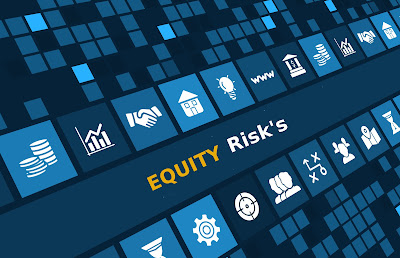Equity Risks one needs to be aware of while Investing
If you are here, you've probably considered investing in equity shares. You, like many others, believe that equity investments are a foolproof way of bringing about steady returns in the long run.
However, many feel hesitant because of the risks associated with equity investments. Perhaps you are put off by the disclaimer that comes at the end of a financial commercial or maybe someone consistently talked bad about investing in equities.
To reassure yourself, you take yourself to the internet and land up here, at the right place! This blog will present all the details you cannot go through on your own and help you make informed decisions.
Equity Investments involve two types of risks: Systematic Risk and Unsystematic Risk. You'll learn more about them below:
This may be a new term for you. Systematic Risk, otherwise known as Market risk, affects all the stocks as well as the overall market directly or indirectly. It means all the companies will be affected rather than specific ones.
The economical and political environment, interest rates, and inflation, such factors can affect the market prices. So, systematic risk is known to be unpredictable and easy to miss.
Now comes a risk you might be familiar with but never learned the name of. The risk specific to a particular company is called Unsystemtic Risk. It can also be an industry. These risks will show when the company undergoes problems or has uncertainties.
Being the counterpart of Systematic Risk, this does not affect the whole market but just a part of it. If the management faces any changes or breaks down, products are recalled, new competitors have emerged or internal strikes are conducted- all count as actions of unsystematic risk.
A famous example that you can relate to is the turmoil the Indian telecommunication sector is going through. Large players are providing low-cost services, affecting the profit of small players.
This is just one example of many. Next, you will learn how to handle the risks.
To avoid such risks, you can plan to select assets based on your investment goals, time frame, and risk tolerance. Diversification will go a long way in helping you handle the risks as it includes a wide variety of assets. All your assets will not be affected when the market is. When a particular set of stocks is not performing well, you can rely on other stocks to help you compensate for the loss.
One more thing you can do is to keep the funds locked in where you won't be able to sell your shares for a time. You can choose to sell the funds when the value increases in the future. Include doing thorough research as it will help you determine the various factors that affect equity investments.
Investing in equities involves both risk and reward. As a beginner or veteran investor, you must plan to stay for the long term. Make sure you do your research and seek advice from a brokerage firm that supports and teaches you the nuances of investing in the stock market.
As time goes on, you will see how valuable equity investments are. Choose a brokerage firm that not only offers the lowest brokerage for trading in India but also gives you a smooth investing experience. Such a firm is Goodwill Wealth Management.

Comments
Post a Comment